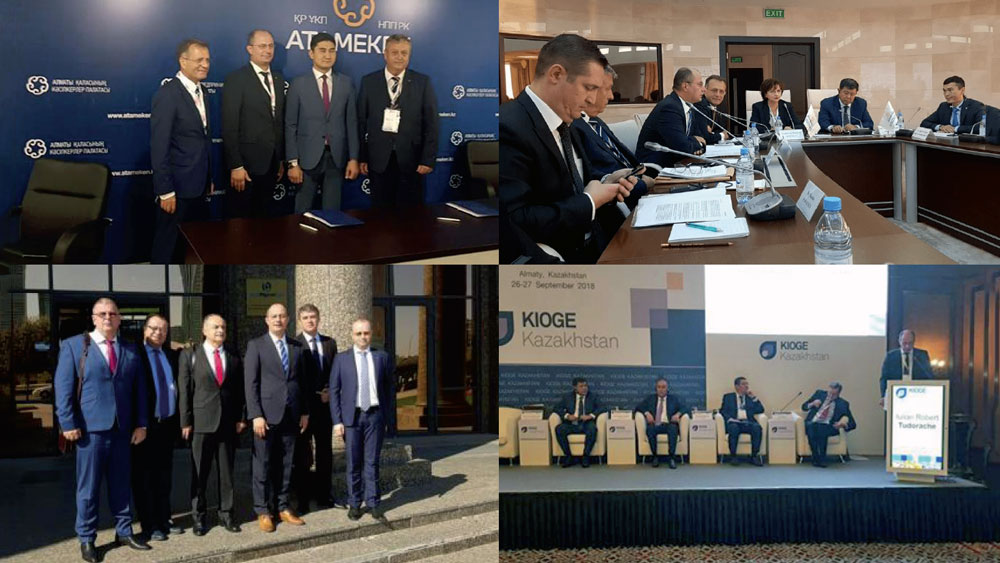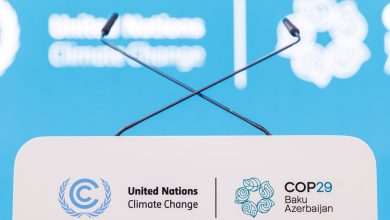Romania, gateway for Kazakh energy resources to the EU market
A number of events took place during 24-28 September in Kazakhstan, in Astana and Almaty, such as the Romania-Kazakhstan Joint Commission for Economic and Technical-Scientific Cooperation, the Kazakhstan-Romania Business Forum, the International Oil and Gas Conference and Exhibition KIOGE 2018 and the Business Forum dedicated to the oil and gas sector. Romania has reiterated on this occasion its interest in capitalizing on the cooperation opportunities in the energy field between the two states.
The Republic of Kazakhstan is an energy player with a significant potential at global level, including in terms of securing energy supply to Europe, crude oil and natural gas in particular. Romania positively notices the increasingly active participation of Kazakhstan in the international dialogue on energy security. Our country shows openness in order to capitalize on cooperation opportunities in the energy sector, amid the interest of Romania and EU states in the energy potential of Central Asia in general and especially in Kazakhstan’s potential in this field. Commercial relations between the two states are based on the Partnership and Collaboration Agreement between the EU and EU Member States, on the one hand, and the Republic of Kazakhstan, on the other hand.
A series of bilateral meetings of the Romanian delegation, led by Iulian-Robert Tudorache, Secretary of State in the Ministry of Energy, with senior Kazakh officials, took place in the margins of the joint work of the Romania-Kazakhstan Joint Commission for Economic and Technical-Scientific Cooperation. The Kazakh side was represented by Energy Minister Kanat Bozumbayev, Energy Vice-Minister Magzum Mirzagaliev, Deputy Minister on Foreign Affairs Roman Vasilenko, Minister of National Economy Timur Suleimenov, Minister of Investment and Development Zhenis Kassymbek.
The Romanian delegation also attended the official opening of the 26th International Oil and Gas Exhibition KIOGE 2018, as well as the Plenary Session of the International Oil and Gas Conference.
“Romania is a main partner for Kazakhstan in Eastern Europe; the Romanian side appreciates the good relations in the energy field between the two countries, the proof being the latest bilateral contacts, as well as Romania’s participation in the International Exhibition Energy of the Future 2017, which was a very good opportunity for oil and gas companies to open up new opportunities of collaboration between the two countries,” Iulian-Robert Tudorache has pointed out.
Romania can represent a gateway for the significant energy resources of the Republic of Kazakhstan, the largest oil producer in Central Asia, to the European Union market and Balkan region. Over 80% of Romania’s oil import comes from Kazakhstan and the Russian Federation.
Iulian-Robert Tudorache has also reminded the long tradition, of over one century and a half, in the oil industry, and over one century in the natural gas industry. Romania is currently the only significant hydrocarbon producer in South-Eastern Europe. Continuing the tradition of some many generations of specialists in the field, Romania aims to be an important participant on a European market that becomes increasingly competitive. The effects of the economic crisis were felt at the level of the oil and gas industry in Romania, as in most countries, through a decrease in consumption, in the financial liquidity level, as well as through difficulties in attracting the funds necessary for new investment objectives.
“The gradual stabilization of oil prices has started to contribute to the revival of investments and we hope this upward trend will be maintained. The oil & gas production sector undoubtedly needs to benefit from investments in modern equipment and technologies, in order to increase the degree of recovery of fields and for the development of new fields,” the Romanian official has added. He also says that at this point, according to European statistics, Romania is the country with the largest oil production in the region, last year producing 3.6 million tons of crude oil.
Romania is one of the founders of the World Petroleum Council, the contribution of our country being highly appreciated by all the members of the council. The Romanian Committee for the World Petroleum Council includes representatives of the largest petroleum companies in Romania, higher education institutions and research institutes, as well as experts from the Ministry of Energy.
Romania also holds an honourable position in terms of gas extraction, with a very low dependence on imports. For example, last year imports accounted for around 10.6%, consumption being covered by domestic production at a rate of 89.4%. The recent developments also indicate a recovery of interest in LNG, and Europe has chances to become a major player in this market segment. Romania also has in this field of activity significant opportunities, being a shareholder in AGRI project, a pioneering project for the transport of liquefied natural gas through the Black Sea.
Iulian-Robert Tudorache has expressed the interest of Romanian companies to participate in licensing rounds organized in the Republic of Kazakhstan for petroleum fields exploration/exploitation activities. At the same time, he has expressed the interest of Romanian companies in the petroleum industry and the industry of related services to export specific equipment for activities in this sector, as well as to develop partnerships with Kazakh companies. In turn, the Kazakh side has noted the quality of equipment and machinery produced by Romanian companies and has expressed its interest in collaborating with equipment and machinery manufacturers in Romania.
The discovery in the Black Sea of important hydrocarbon reserves may give this region a central role in the consolidation of energy security of both Romania and the entire region. The energy potential of the Black Sea gives it a significant geostrategic role for the European Union due to the estimated hydrocarbon reserves, but also in terms of oil and gas reserves in the Caspian Sea region, which could transit the Black Sea basin, to be capitalized on the European market.
An important objective of Romania mentioned by the State Secretary is the interconnection of the national oil transmission system to the regional and European networks. According to NSI (National Institute of Statistics), last year our country processed 11.2 million tons, of which 7.6 million tons of crude oil from import. Most oil comes from the Russian Federation, Kazakhstan and Azerbaijan, but also from other countries (approximately 2.8 million tons were imported from the Russian Federation, from Kazakhstan – around 3 million tons, and from Azerbaijan – 0.65 million tons).
State Secretary Tudorache has insisted on the importance of activities of Conpet and Oil Terminal, with the latter having a strategic position, being the largest operator by sea, specializing in handling crude oil, petroleum products, liquid petrochemical products and other liquid products and raw materials, for import, export and transit.
Oil Terminal Constanta holds one of the largest terminals in South-Eastern Europe. The advantages of the location which gives its strategic position are: terminal to the Black Sea, access to roads and railways, the existence of three large storage facilities equipped with tanks with a total storage capacity of 1,700,000 cubic meters, loading/unloading capacities of petroleum and chemical products at rail ramps with a total length of 30 km and transport pipelines for loading/unloading petroleum and chemical products. The Romanian side has stressed that, considering that the Romanian state is investing significant amounts in Constanta port infrastructure (breakwater extensions, dredging in the port), it is important to involve the KazMunayGas Group in supporting the oil terminal’s activity for both crude oil imports and exports of finished products.
Kazakh-Romanian joint energy investment fund
KMG International (KMGI), part of KazMunayGas, and the Government of Romania plan to complete the necessary procedures to create a joint investment fund in the near future aiming at activating cooperation between the two sides. The fund will be established as part of the implementation of the provisions of the Memorandum of Mutual Understanding signed by the parties in 2013 and that provides for the attraction of extra finances in the KMGI’s projects within Romania. The document also includes a mechanism to private Rompetrol Rafinare’s shares owned by Romania and the order to found a joint investment fund in energy.
“The parties – the Romanian Energy Minster and KMGI – closely cooperate on this matter and significantly moved forward in terms of the implementation of the Memorandum’s first stage, namely the creation of the Kazakhstan-Romania investment fund. We hope we will declare its establishment in the near future,” the State Secretary Tudorache stated. He also noted that the projects planned to implement under the auspice of the fund would be considered in accordance with the investment transparency principles and picked up taking into accounting clear and precise assessment criteria and mechanisms.
“During the discussions we had with KMGI representatives, two projects that could be developed under the Romanian-Kazakh Fund have been addressed. They relate to the development of a cogeneration plant on the Petromidia platform, as well as expanding the Rompetrol filling station network on the Romanian market by greenfield investment, with investment in the two projects amounting to approximately USD 220 million,” Iulian-Robert Tudorache added.
Collaboration in the nuclear field
The Kazakh side has also expressed its intention to develop a collaboration in the nuclear field, mainly in the field of supply of uranium and nuclear fuel components. It has highlighted the interest of JSC NAC Kazatomprom for direct negotiations with SNN and CNU in order to diversify directions of cooperation and carry out an exchange of information in the mentioned field. The Romanian side has expressed its availability to carry out talks on this subject in the near future.
Exchange of experience between specialists
Last but not least, Iulian-Robert Tudorache has mentioned the importance of achieving an exchange of experience between the specialists of the two countries; the Romanian side believes that it can consolidate bilateral relations in the oil and gas sector. At the same time, the exchange of best practices between businessmen can open up new opportunities of collaboration between the two countries. At the same time, he has highlighted the importance of making academic exchanges and establishing study programs that Romania can ensure for Kazakh students in the oil and gas field, within the Oil and Gas University in Ploiesti, an educational institution that has won a well-deserved place in the elite of profile universities around the world.







